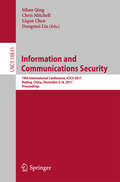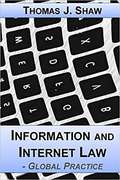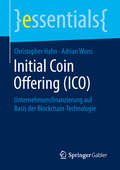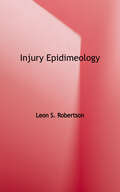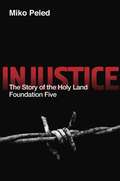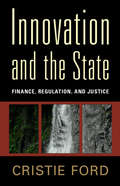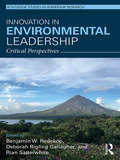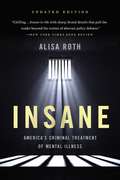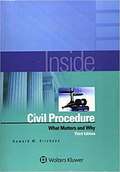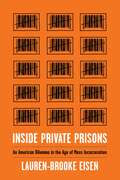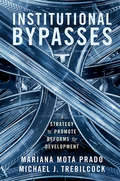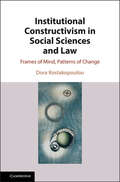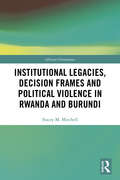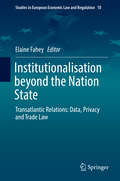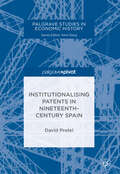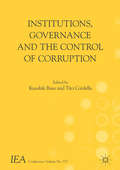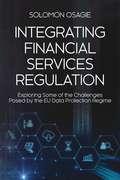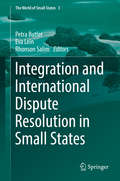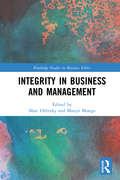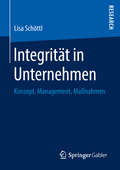- Table View
- List View
Information and Communications Security: 17th International Conference, Icics 2015, Beijing, China, December 9-11, 2015, Revised Selected Papers (Lecture Notes In Computer Science #9543)
by Chris Mitchell Liqun Chen Sihan Qing Dongmei LiuThis book constitutes the refereed proceedings of the 19th International Conference on Information and Communications Security, ICICS 2017, held in Beijing, China, in December 2017. The 43 revised full papers and 14 short papers presented were carefully selected from 188 submissions. The papers cover topics such as Formal Analysis and Randomness Test; Signature Scheme and Key Management; Algorithms; Applied Cryptography; Attacks and Attacks Defense; Wireless Sensor Network Security; Security Applications; Malicious Code Defense and Mobile Security; IoT Security; Healthcare and Industrial Control System Security; Privacy Protection; Engineering Issues of Crypto; Cloud and E-commerce Security; Security Protocols; Network Security.
Information and Internet Law: Global Practice
by Thomas ShawThe worlds of today and tomorrow rely upon open networks connecting far-flung participants exchanging information both personal and commercial. Bringing some certainty to this very dynamic environment are the legal foundations supporting the free flow of information over the Internet. <p><p> New lawyers, lawyers new to information and Internet law, lawyers updating their knowledge on the latest statutes and cases, and lawyers desiring a global comparative legal perspective are among the audiences who require this single resource to consolidate their understanding of global information and Internet law. This book, up-to-date to March 2018, provides insight by looking at current statutes, regulations, and directives in the United States and Europe, supplemented by statutes in Asia and the Americas ex-U.S. It discusses and identifies issues raised by the latest U.S. and EU cases on protection of information and use of the Internet. <p><p> It starts with a risk-based, lifecycle approach to this area of law. The areas of information law addressed: privacy, information security, and data protection law, unlawful data disclosures through cybercrime and data breach, and lawful data disclosures related to messaging and surveillance. The areas of Internet law addressed: access, jurisdiction, speech, intermediary liability, intellectual property, and e-commerce through electronic and website agreements. Bringing a unique perspective to explain a complex topic, the author has written numerous books on legal technology and legal history, writes and speaks extensively on the latest developments in technology law, teaches U.S.-EU comparative law school courses on information, Internet, and emerging technologies law, and had worked in complementary disciplines across the major parts of the world. This book is the result of those many years of experience and insight.
Initial Airworthiness: Determining The Acceptability Of New Airborne Systems
by Guy GrattonDesigned as an introduction for both advanced students in aerospace engineering and existing aerospace engineers, this book covers both engineering theory and professional practice in establishing the airworthiness of new and modified aircraft. Initial Airworthiness includes information on:· how structural, handling, and systems evaluations are carried out;· the processes by which safety and fitness for purpose are determined; and· the use of both US and European unit systemsCovering both civil and military practice and the current regulations and standards across Europe and North America, Initial Airworthiness will give the reader an understanding of how all the major aspects of an aircraft are certified, as well as providing a valuable source of reference for existing practitioners.This second edition has been updated for changes in regulation worldwide, including UK "E-conditions" and Single Seat De-Regulation, the new part 23 regulations in the USA and Europe, and developments to Extended Range Twin-Engine Operations worldwide. Entirely new sections have been added to explain the management of certification programmes, professional ethics within airworthiness practice, environmental impact of aircraft, and aeroplane departures from controlled flight. This edition also includes many new figures, case studies and references to sources of further information.
Initial Coin Offering: Unternehmensfinanzierung Auf Basis Der Blockchain-technologie (Essentials)
by Christopher Hahn Adrian WonsDas essential vermittelt einen Einblick in den Ablauf und die Funktionsweise eines Initial Coin Offering (ICO) als innovative Finanzierungsmethode für Start-up-Unternehmen. Ein ICO erzielt unabhängig von klassischen Kapitalgebern schnell eine große Reichweite möglicher Investoren und erfolgt dabei rein digital auf Basis der Blockchain-Technologie. Die Autoren erläutern die Bedeutung und die Struktur eines ICO sowie die Notwendigkeit für junge Unternehmen, sich frühzeitig mit den rechtlichen Anforderungen und der Planung auseinanderzusetzen. Das essential enthält zahlreiche Übersichten zum illustrativen Verständnis sowie praxisnahe Checklisten zur Planung und Durchführung eines ICOs.
Injury Epidemiology: Fourth Edition
by Leon S. RobertsonResearch on injuries is a high priority to inform public policy that reduces deaths, hospitalizations and associated costs. Principles for research design and analysis of injury incidence and severity are emphasized. Review of extant surveillance data reveals numerous flaws that must be changed to increase usefulness of the data. Research designs of studies of injury causation and evaluation of countermeasures are often inappropriate and mislead analytic and injury control efforts. Appendices to chapters illustrate research projects that influenced public policy affecting the reduction of motor vehicle fatalities per population by half in the U.S. The principles illustrated by these studies can be applied to other types of injury.
Injury and Injustice: The Cultural Politics of Harm and Redress (Cambridge Studies in Law and Society)
by David M. Engel Anne Bloom Michael McCannThis book addresses some of the most difficult and important debates over injury and law now taking place in societies around the world. The essays tackle the inescapable experience of injury and its implications for social inequality in different cultural settings. Topics include the tension between physical and reputational injuries, the construction of human injuries versus injuries to non-human life, virtual injuries, the normalization and infliction of injuries on vulnerable victims, the question of reparations for slavery, and the paradoxical degradation of victims through legal actions meant to compensate them for their disabilities. Authors include social theorists, social scientists and legal scholars, and the subject matter extends to the Middle East and Asia, as well as North America.
Injustice: The Story of the Holy Land Foundation Five
by Miko Peled<p>In July 2004, federal agents raided the homes of five Palestinian-American families, arresting the five dads. The first trial of the "Holy Land Foundation Five" ended in a hung jury. The second, marked by highly questionable procedures, resulted in very lengthy sentences--for "supporting terrorism" by donating to charities that the U.S. government itself and other respected international agencies had long worked with. <p>In 2013, human rights activist and author Miko Peled started investigating this case. He discussed the miscarriages of justice with the men's lawyers and heard from the men's families about the devastating effects the case had on their lives. He also traveled to the remote federal prison complexes where the men were held to conduct deep interviews. Injustice traces the labyrinthine course of this case, presenting a terrifying picture of governmental over-reach in post-9/11 America.</p>
Innovation and the State: Finance, Regulation, and Justice
by Cristie FordFrom social media to mortgage-backed securities, innovation carries both risk and opportunity. Groups of people win, and lose, when innovation changes the ground rules. Looking beyond formal politics, this new book by Cristie Ford argues that we need to recognize innovation, and financial innovation in particular, as a central challenge for regulation. Regulation is at the leading edge of politics and policy in ways that we have not yet fully grasped. Seemingly innocuous regulatory design choices have clear and profound practical ramifications for many of our most cherished social commitments. Innovation is a complex phenomenon that needs to be understood not only in technical terms, but also in human ones. Using financial regulation as her primary example, Ford argues for a fresh approach to regulation, which recognizes innovation for the regulatory challenge that it is, and which binds our cherished social values and our regulatory tools ever more tightly together.
Innovation in Environmental Leadership: Critical Perspectives (Routledge Studies in Leadership Research)
by Benjamin W. Redekop Deborah Rigling Gallagher Rian SatterwhiteInnovation in Environmental Leadership offers innovative approaches to leadership from a post-industrial and ecological vantage point. Chapters in this collection are written by leading scholars and practitioners of environmental leadership from around the globe, and are informed by a variety of critical perspectives, including post-heroic approaches, systems thinking, and the emerging insights of Critical Leadership Studies (CLS). By taking the natural environment seriously as a foundational context for leadership, Innovation in Environmental Leadership offers fresh insights and compelling visions of leadership pertinent to 21st century environmental and social challenges. Concepts and understandings of leadership emerged as part of an extractive industrial system; this work asks its readers to re-think what leadership looks like in an ecologically sustainable biological system. This book provides fresh insights and critical perspectives on the vibrant and growing field of environmental leadership. It shows the latest state of knowledge on the topic and will be of interest both to students at an advanced level, academics and reflective practitioners. It addresses the topics with regard to leadership theory and environmental leadership and will be of interest to researchers, academics, and students in the fields of sustainability, environmental ethics, natural resource management, environmental studies, business management, public policy, and environmental management.
Insane: America's Criminal Treatment of Mental Illness
by Alisa RothAn urgent exposé of the mental health crisis in our courts, jails, and prisonsAmerica has made mental illness a crime. Jails in New York, Los Angeles, and Chicago each house more people with mental illnesses than any hospital. As many as half of all people in America's jails and prisons have a psychiatric disorder. One in four fatal police shootings involves a person with such disorders.In this revelatory book, journalist Alisa Roth goes deep inside the criminal justice system to show how and why it has become a warehouse where inmates are denied proper treatment, abused, and punished in ways that make them sicker.Through intimate stories of people in the system and those trying to fix it, Roth reveals the hidden forces behind this crisis and suggests how a fairer and more humane approach might look. Insane is a galvanizing wake-up call for criminal justice reformers and anyone concerned about the plight of our most vulnerable.
Inside Civil Procedure: What Matters and Why (Inside)
by Howard M. Nbsp Nbsp ErichsonInside Civil Procedure: What Matters and Why, like a great teacher, helps law students understand civil procedure clearly and deeply. Procedural rules and doctrines that at first seem incomprehensible finally make sense when students understand what the rules are trying to do, how they are used in practice, and how they fit into the bigger picture. <p><p> Unlike oversimplified outlines or lengthy treatises, it actually teaches with clear explanations and features designed to help students master the material. By the end of each chapter, students will have a clear understanding of not only how the rules and doctrines work, but also how the pieces of the puzzle fit together.
Inside Private Prisons: An American Dilemma in the Age of Mass Incarceration
by Lauren-Brooke EisenWhen the tough-on-crime politics of the 1980s overcrowded state prisons, private companies saw potential profit in building and operating correctional facilities. Today more than a hundred thousand of the 1.5 million incarcerated Americans are held in private prisons in twenty-nine states and federal corrections. Private prisons are criticized for making money off mass incarceration—to the tune of $5 billion in annual revenue. Based on Lauren-Brooke Eisen’s work as a prosecutor, journalist, and attorney at policy think tanks, Inside Private Prisons blends investigative reportage and quantitative and historical research to analyze privatized corrections in America.From divestment campaigns to boardrooms to private immigration-detention centers across the Southwest, Eisen examines private prisons through the eyes of inmates, their families, correctional staff, policymakers, activists, Immigration and Customs Enforcement employees, undocumented immigrants, and the executives of America’s largest private prison corporations. Private prisons have become ground zero in the anti-mass-incarceration movement. Universities have divested from these companies, political candidates hesitate to accept their campaign donations, and the Department of Justice tried to phase out its contracts with them. On the other side, impoverished rural towns often try to lure the for-profit prison industry to build facilities and create new jobs. Neither an endorsement or a demonization, Inside Private Prisons details the complicated and perverse incentives rooted in the industry, from mandatory bed occupancy to vested interests in mass incarceration. If private prisons are here to stay, how can we fix them? This book is a blueprint for policymakers to reform practices and for concerned citizens to understand our changing carceral landscape.
Insider Trading: Law, Ethics, And Reform
by John P. AndersonAs long as insider trading has existed, people have been fixated on it. Newspapers give it front page coverage. Cult movies romanticize it. Politicians make or break careers by pillorying, enforcing, and sometimes engaging in it. But, oddly, no one seems to know what's really wrong with insider trading, or - because Congress has never defined it - exactly what it is. This confluence of vehemence and confusion has led to a dysfunctional enforcement regime in the United States that runs counter to its stated goals of efficiency and fairness. In this illuminating book, John P. Anderson summarizes the current state of insider trading law in the US and around the globe. After engaging in a thorough analysis of the practice of insider trading from the normative standpoints of economic efficiency, moral right and wrong, and virtue theory, he offers concrete proposals for much-needed reform.
Inspector Oldfield and the Black Hand Society: America's Original Gangsters and the U.S. Postal Detective who Brought Them to Justice
by Victoria Bruce William OldfieldThe incredible true story of the US Post Office Inspector who took down the deadly Black Hand, a turn-of-the-century Italian-American secret society that preyed on immigrants across America’s industrial heartland—featuring fascinating and never-before-seen documents and photos from the Oldfield family’s private collection.Before the emergence of prohibition-era gangsters like Al Capone and Lucky Luciano, there was the Black Hand: an early twentieth-century Sicilian-American crime ring that preyed on immigrants from the old country. In those days, the FBI was in its infancy, and local law enforcement were clueless against the dangers—most refused to believe that organized crime existed. Terrorized victims rarely spoke out, and the criminals ruled with terror—until Inspector Frank Oldfield came along. In 1899, Oldfield became America’s 156th Post Office Inspector—joining the ranks of the most powerful federal law enforcement agents in the country. Based in Columbus, Ohio, the unconventional Oldfield brilliantly took down train robbers, murderers, and embezzlers from Ohio to New York to Maryland. Oldfield was finally able to penetrate the dreaded Black Hand when a tip-off put him onto the most epic investigation of his career, culminating in the 1909 capture of sixteen mafiosos in a case that spanned four states, two continents—and ended in the first international organized crime conviction in the country. Hidden away by the Oldfield family for one hundred years and covered-up by rival factions in the early 20th century Post Office Department, this incredible true story out of America’s turn-of-the-century heartland will captivate all lovers of history and true crime.
Institutional Bypasses: A Strategy to Promote Reforms for Development
by Michael J. Trebilcock Mariana Mota PradoInstitutional bypass is a reform strategy that creates alternative institutional regimes to give citizens a choice of service provider and create a form of competition between the dominant institution and the institutional bypass. While novel in the academic literature, the concept captures practices already being used in developing countries. In this illuminating book, Mariana Mota Prado and Michael J. Trebilcock explore the strengths and limits of this strategy with detailed case studies, showing how citizen preferences provide a benchmark against which future reform initiatives can be evaluated, and in this way change the dynamics of the reform process. While not a 'silver bullet' to the challenge of institutional reform, institutional bypasses add to the portfolio of strategies to promote development. This work should be read by development researchers, scholars, policymakers, and anyone else seeking options on how to promote change and implement reforms in developing countries around the world.
Institutional Constructivism in Social Sciences and Law: Frames of Mind, Patterns of Change
by Dora KostakopoulouThis book proposes a new institutional constructivist model, for social scientific and legal enquiries, based on the interrelations within the social and political world and the application of change in EU laws and politics. Much of the research conducted in social sciences and law examines the diverse activities of individuals and collectivities and the role of institutions in the social and political world. Although there exist many vantage points from which one can gain entry into understanding how agents in the world act, interact, shape and bear the world, socio-legal scientific epistemology has found monism and dualism to be convincing models. This book argues that current models do not capture the complexity of our micro-worlds, macro-worlds and meso-worlds. Nor can they account for the forms and patterns of socio-legal change. Mind, time and change are brought together in an attempt to contribute to socio-legal epistemology and to enhance its toolkit.
Institutional Legacies, Decision Frames and Political Violence in Rwanda and Burundi (African Governance)
by Stacey MitchellRwanda and Burundi are strikingly similar countries that underwent democratization in the early 1990s. In both, resistance to democratic reforms led to coups d’état and presidential assassinations. A conundrum arises in terms of what transpires next. In Rwanda, total genocide was perpetrated by extremist Hutu actors, including government officials, upon the country’s Tutsi and politically moderate Hutu populations. In Burundi the coup d’état failed and instead ushered in a lengthy period of civil war. This divergence in outcome is puzzling given the similarity of these two countries, and it is not adequately explained by studies that address collective violence in each. This book utilizes an integrative approach that facilitates the formation of an explanation that more fully accounts for variation in the type of collective violence that occurred in Rwanda and Burundi. Showing that political actors – during periods of major institutional change – do not all respond to or perceive reform in the exact same manner or in a necessarily rational manner, this book makes an important contribution to the literature on ethnic conflict, collective violence and democratization in Africa.
Institutionalisation beyond the Nation State: Transatlantic Relations - Data, Privacy And Trade Law (Studies in European Economic Law and Regulation #10)
by Elaine FaheyThis volume collects papers that explore institutionalisation in contemporary transatlantic relations. Policymakers, lawyers, and political scientists reflect on contemporary understandings of the process as an integration of regimes and orders from an EU perspective. The papers assess whether contemporary transatlantic relations call for a different approach to global governance with a heightened emphasis on institutionalisation. The book explores a diverse range of case studies of interest to a broad readership. In particular, it focuses upon two cutting-edge issues: transatlantic data privacy rules that are emerging after the post-Edward Snowdon / NSA / PRISM revelations; and trade aspects, especially the Transatlantic Trade and Investment Partnership (TTIP) Agreement. The contributors consider these case studies from a variety of perspectives, honing in on the dynamism, method, and high politics of transatlantic relations as they have recently evolved. They critically explore the commonly held assumption that transatlantic relations have historically been considered quasi-institutionalised at best or, at worst, lacking in terms of laws and institutions. Is institutionalisation a useful meeting point for all disciplines? Does it explain regional integration meaningfully across subjects? Can institutionalisation serve to promote accountability and good governance? Contributors across disciplines and subjects address these increasingly challenging and salient questions.
Institutionalising Patents in Nineteenth-Century Spain (Palgrave Studies in Economic History)
by David PretelThis book examines the development of the Spanish patent system in the years 1826 to 1902, providing a fundamental reassessment of its evolution in an international context. The Spanish case is particularly interesting because of this country’s location on the so-called European periphery and also because of the centrality of its colonial dimension. Pretel gauges the political regulation and organisation of the system, showing how it was established and how it evolved following international patterns of technological globalisation and the emergence of the ‘international patent system’ during the late nineteenth century. Crucially, he highlights the construction and evolution of the patent system in response to the needs of Spain's technologically dependent economy. The degree of industrial backwardness in mid-nineteenth-century Spain set the stage for the institutionalisation of its modern patent system. This institutionalisation process also entailed the introduction of a new technological culture, social infrastructure and narrative that supported intellectual property rights. This book is important reading to all those interested in the history of patents and their role in globalisation.
Institutions, Governance and the Control of Corruption (International Economic Association Series)
by Kaushik Basu Tito CordellaThis book considers how emerging economies around the world face the challenge of building good institutions and effective governance, since so much of economic development depends on having these in place. The promotion of shared prosperity and the battle against poverty require interventions to reach out to the poor and the disadvantaged. Yet time and again we have seen such effort foild or diminished by corruption and leakage. The creation of good governance and institutions and structures to combat corruption require determination and passion but also intricate design rooted in data, analysis, and research. In this book, leading researchers from around the world bring to the table some of the best available ideas to help create better governance structures, design laws for corruption control, and nurture good institutions.
Integrating Financial Services Regulation: Exploring Some of the Challenges Posed by the EU Data Protection Regime
by Solomon OsagieThe book charts the course and the history of how the regulation of financial services has evolved looking particularly at data protection. It addresses concepts like integration theory, the behaviour of nation-states when they attempt to forge geo-political unions and the implications and outcomes of state interaction in regulatory matters. Unlike many other General Data Protection Regulation (GDPR) publications in the market, it contains useful analyses of the GDPR but it does so in a very practical and informative way. It recognises the perspectives of various interests including academics and commercial organisations and presents the subject in a compelling, historical and easy to digest manner, starting with the challenges of integration that the EU has faced. It then charts the course of general financial services regulation, focusing on the history of data protection legislation in the EU and drawing out the real challenges that are presented by the legislative framework. There is an in-depth analysis of the GDPR with examples of the derogations and areas where individual states are still able to derogate. The book ends with suggestions for the application and further review of the GDPR.°In the presentation of the history of data protection regulation, the author shows the influence of the contrasting narratives of privacy rights versus the desire to enable commercial activity to thrive. There are examples of how the failure to harmonise the regulation of data processing has left individual EU states able to assert national influence so that commercial organisations have been left with a legal framework that impedes the development of a single market even with the increasing importance of big data and processing in financial services. The book then highlights key provisions of the GDPR that are designed to address some of the challenges by centralising interpretation, defining flow-downs and harmonising enforcement and regulatory provisions across the EU.
Integration and International Dispute Resolution in Small States (The World of Small States #3)
by Petra Butler Eva Lein Rhonson SalimThis book provides an insight into commercial relations between large economies and Small States, the benefits of regional integration, the role of Small States as financial centres as well as B2B and State to State dispute resolution involving Small States. Several contributions allow the reader to familiarise themselves with the general subject matter; others scrutinise the particular issues Small States face when confronted with an international dispute and discuss new and innovative solutions. These solutions range from inventive ideas to help economic growth to appropriate mechanisms of dispute resolution including inter-State dispute resolution and specific areas of arbitration such as tax arbitration. Researchers, policy advisors and practitioners will find a wealth of insights, information and practical ideas in this book.
Integrity in Business and Management: Cases and Theory (Routledge Studies in Business Ethics)
by Marc Orlitzky Manjit MongaThis book highlights the interconnectedness of integrity with philosophical history, leadership, managerial decision-making, and organizational effectiveness in a wide variety of contexts (e.g., time theft in organizations and family business). Well-known researchers in business ethics from all around the world reframe the literature on integrity in business and management and develop updated and more comprehensive models of integrity. Integrity in Business and Management connects integrity to both ancient thought and the modern philosophy of pragmatism, but also explains how contemporary societal trends may shape the way we think about integrity. The final chapter warns against oversocialized conceptualizations of integrity and argues for a clear differentiation between personal integrity and moral integrity. Aimed at researchers and academics in the fields of business ethics and organizational leadership, Integrity in Business and Management explicates and critiques prior models of managerial integrity in a wide variety of disciplines, covering economics, moral philosophy, business ethics, organizational behavior, sociology, history, and psychology and offers a helpful set of readings in advanced undergraduate and postgraduate courses of business ethics, corporate governance, corporate social responsibility, and leadership to stimulate discussions about personal integrity, moral integrity, and organizational leadership.
Integrität in Unternehmen: Konzept, Management, Maßnahmen
by Lisa SchöttlUnternehmen stehen in der Verantwortung, eine Vielzahl an Werten in ihrem Geschäft zu beachten, allen voran den der Integrität. Das Buch beantwortet die Frage, was Integrität für Unternehmen bedeutet und wie integres Unternehmenshandeln erreicht werden kann. Die Autorin entwickelt einen theoretisch fundierten und praktisch anwendbaren Ansatz der Unternehmensintegrität und gibt Orientierung, wie dieser durch vielfältige Maßnahmen im Rahmen von Integrity Management umgesetzt werden kann. Dabei werden klassische Compliance-Ansätze um eine werteorientierte Perspektive ergänzt, damit Unternehmen ihre je eigene Verantwortung wahrnehmen können.
Intellectual Property Rights and Emerging Technology: 3D Printing in China
by James Griffin Hing Kai Chan Hui Leng Choo Onyeka Osuji3D printing poses many challenges to the traditional law of intellectual property (IP). This book develops a technical method to help overcome some of these legal challenges and difficulties. This is a collection of materials from empirical interviews, workshops and publications that have been carried out in one of the world's leading research projects into the legal impact of 3D printing. The project was designed to establish what legal challenges 3D printing companies thought they faced, and having done that, to establish a technical framework for a solution.
